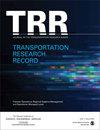Adaptive Multi-Objective Algorithm for the Sustainable Electric Vehicle Routing Problem in Medical Waste Management
IF 1.8
4区 工程技术
Q3 ENGINEERING, CIVIL
引用次数: 0
Abstract
This paper addresses the complex issue of managing medical waste transportation using electric vehicles, with the goal of minimizing both energy consumption and the risks associated with hazardous waste. A multi-objective mixed-integer linear programming model is introduced, incorporating practical factors such as time windows, partial recharge policy, load-dependent discharge, infection risk, and trips to waste disposal facilities. Our proposed method, a combination of the multi-objective evolutionary algorithm using decomposition (MOEA/D) with adaptive large neighborhood search (ALNS) and local search (LS) techniques, is referred to as MOEA/D-ALNS. This method demonstrates superior performance compared with the non-dominated sorting genetic algorithm, NSGA-II, modified MOEA/D and MOEA/D-LNS in benchmark instances with realistic assumptions. Our experimental results revealed an inverse correlation between energy consumption and risk objectives. Sensitivity analyses showed that eliminating time-window constraints results in more energy-efficient and safer routes while maintaining a slightly lower battery energy level can strike an ideal balance between energy consumption, risk, and battery health. This research contributes to the understanding of infectious medical waste management with its consideration of electric vehicles and waste disposal. It lays a solid foundation for future studies aiming to improve the sustainability and efficiency of medical waste routing practices.医疗废物管理中可持续电动车路径问题的自适应多目标算法
本文解决了使用电动汽车管理医疗废物运输的复杂问题,目标是最大限度地减少能源消耗和与危险废物相关的风险。引入了一个多目标混合整数线性规划模型,该模型考虑了时间窗口、部分充值策略、负荷相关放电、感染风险和前往废物处理设施的行程等实际因素。本文提出的方法将基于分解的多目标进化算法(MOEA/D)与自适应大邻域搜索(ALNS)和局部搜索(LS)技术相结合,称为MOEA/D-ALNS。在具有现实假设的基准测试实例中,与非支配排序遗传算法、NSGA-II、改进的MOEA/D和MOEA/D- lns算法相比,该方法表现出优越的性能。我们的实验结果揭示了能源消耗和风险目标之间的负相关关系。敏感性分析表明,消除时间窗限制可以实现更节能、更安全的路线,同时保持稍低的电池能量水平,可以在能耗、风险和电池健康之间取得理想的平衡。本研究有助于理解感染性医疗废物管理,并考虑到电动汽车和废物处理。它为未来旨在提高医疗废物处理实践的可持续性和效率的研究奠定了坚实的基础。
本文章由计算机程序翻译,如有差异,请以英文原文为准。
求助全文
约1分钟内获得全文
求助全文
来源期刊

Transportation Research Record
工程技术-工程:土木
CiteScore
3.20
自引率
11.80%
发文量
918
审稿时长
4.2 months
期刊介绍:
Transportation Research Record: Journal of the Transportation Research Board is one of the most cited and prolific transportation journals in the world, offering unparalleled depth and breadth in the coverage of transportation-related topics. The TRR publishes approximately 70 issues annually of outstanding, peer-reviewed papers presenting research findings in policy, planning, administration, economics and financing, operations, construction, design, maintenance, safety, and more, for all modes of transportation. This site provides electronic access to a full compilation of papers since the 1996 series.
 求助内容:
求助内容: 应助结果提醒方式:
应助结果提醒方式:


